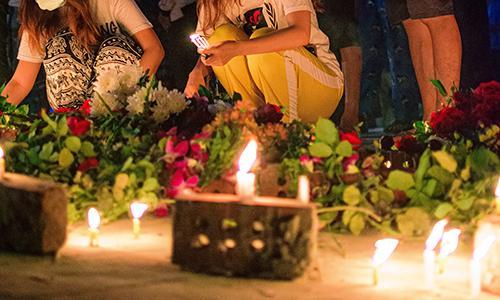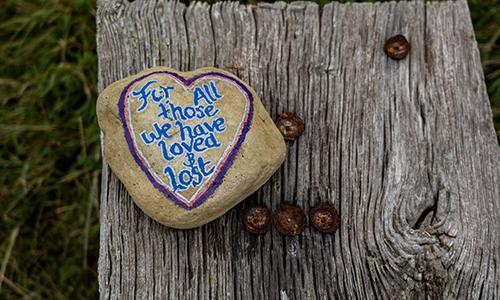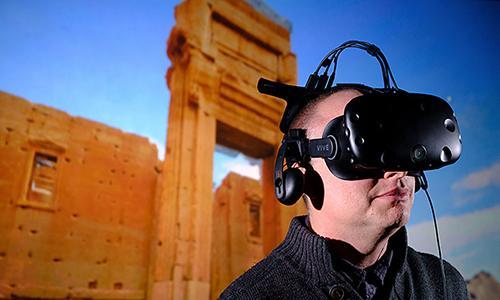The Role of Archaeology in Grief
The psychology of death, dying and bereavement is a timely topic in the context of elevated levels of mortality associated with Covid-19. According to the British Psychological Society (BPS) we are poor at dealing with bereavement. Death and grieving are difficult topics but according to the BPS, open discussion can help the healing process. Research has shown that the “professional” and the “personal” mix together in surprising ways when professionals are faced with experiences of death and dead bodies. There is both ‘wonder’ and ‘ordeal’ in confronting the end of life. Generating new meanings for difficult experiences can help alleviate psychological distress.
At the Palliative Care Congress in 2014, the conference called for new ways to talk about death. Inspired by this, and through noticing how conversations were sparked when talking about funerary archaeology, Dr Karina Croucher, an archaeologist at the University of Bradford, along with Professor Christina Faull in palliative medicine and Dr Laura Green, a nursing lecturer, trialled the use of archaeology to facilitate discussions around death, bereavement and loss.
In the project Continuing Bonds: exploring the meaning and legacy of death through past and contemporary practice, Dr Karina Croucher, University of Bradford’s Associate Professor in the School of Archaeological and Forensic Sciences, and her team, generated new personal understandings of death and bereavement by turning to the ancient past. Archaeological research reveals that ancient cultures had a different attitude that encouraged a better-adapted perspective on death and grieving.

The Continuing Bonds project, underpinned by psychological theory, draws on archaeology to facilitate conversation and openness on death and grief in a way that improves psychological and physical well-being, and builds resilience. This unique and ground-breaking collaboration between psychology, end of life care and archaeology; Continuing Bonds and its follow-on projects, had profound impact on project participants (health and social care professionals, students, and members of the public), and on their social and professional circles.
We are proud that the value of the project has been recognised by the Queen's Anniversary Prize for Higher and Further Education (2021), as part of the School of Archaeological and Forensic Sciences' award for archaeology and societal impact.
Dr Karina Croucher
Evidence demonstrates that archaeology was a catalyst for productive conversations about the difficult subjects of death, dying, bereavement and loss. As a meaningful and positive experience, the project was transformative, leading to significant personal growth. For some in the study this led to powerful changes in their professional practice. The intervention challenged cultural norms and highlighted diversity of death practices, changing participants’ beliefs, values, attitudes, and behaviours.

Both psychology and archaeology connect shared ideals between these disciplines of respect and compassion to learn psychological lessons from the long dead. In this study, the team investigated a new, creative approach to opening dialogue around death, dying, bereavement and loss. Using archaeology, it provided an alternative framework for reflecting on death, through accessible archaeological case studies that illuminated the variety of methods by which past societies have dealt with the dead. Moreover, it focused on one particularly enduring concept: that of “Continuing Bonds” with the dead, which recognises that death is not the end of relationships between the living and the dead, but that the dead continue to have meaning and significance in the lives of the living.
The original Continuing Bonds study inspired further projects: Creative Dissemination (with Melanie Giles, University of Manchester and Jennifer Dayes, MMU) used archaeology and original Continuing Bonds participant experiences to normalise talk of the dead and inspire creative writing, through workshops with members of the public in Bradford, Manchester, and Sheffield, culminating in an anthology and celebration event where participants read their work to friends, families, and stakeholders; Dying to Talk (with Jane Booth, University of Wolverhampton, Eleanor Bryant and Aoife Sutton, University of Bradford, and Child Bereavement UK) has co-produced resources with young people, for young people, to build resilience and compassionate communities; the Continuing Bonds Toolkit, is a web resource for professional development for counsellors and therapists and a tool that can be used in the therapy room.
Karina’s collaborative, interdisciplinary research stems from a passion for making the past relevant to communities today and is driving the use of archaeology and heritage for enhancing wellbeing. As well as Continuing Bonds research, she is involved in the GCRF mental health cluster, aimed at promoting mental health and wellbeing in overseas research, and the BReaTHe (Building Resilience Through Heritage) project which uses archaeology and heritage for cohesion and wellbeing among refugee and host communities.
She is also passionate about teaching and learning, recently co-authoring Assembling Archaeology: Teaching, practice and research, which encourages us to break down boundaries between teaching, research and practice. Her archaeological research is now inspired by contemporary theories of grief and bereavement, where she is researching funerary practices from prehistoric southwest Asia, which sees the present informing our understandings of the past. Karina comes form a non-traditional career path, having worked in catering before entering university as a mature student to study archaeology. As such, she is committed to education for all and to breaking down inequalities.
-500x300.jpg)
More information on the Queen's Anniversary Prize
The University of Bradford has been awarded a coveted Queen's Anniversary Prize for Higher and Further Education for its world-leading work in developing archaeological technology and techniques and its influence on practice, policy and society.

